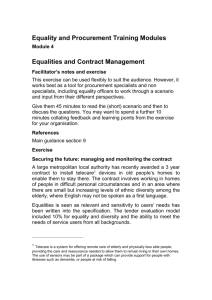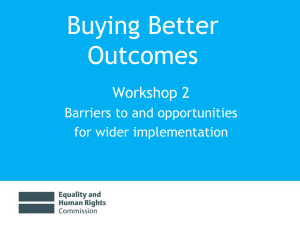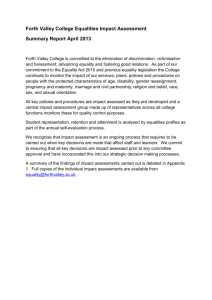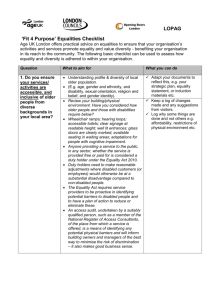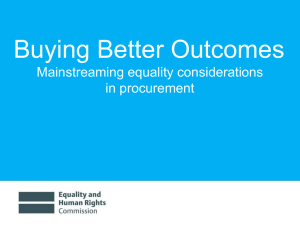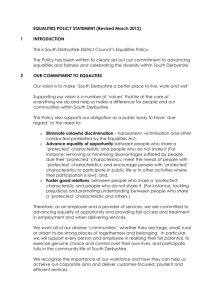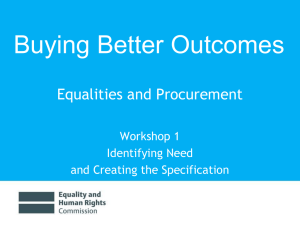powerpoint - Equality and Human Rights Commission
advertisement
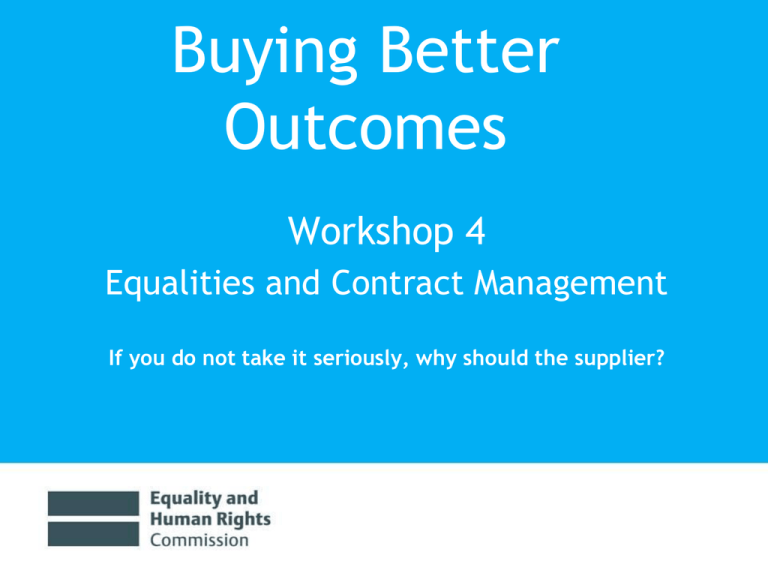
Buying Better Outcomes Workshop 4 Equalities and Contract Management If you do not take it seriously, why should the supplier? Managing the contract effectively Effective contract management is crucial to delivering the equality benefits we are looking for. Consider how equalities and diversity will affect your or the contract manager’s ability to manage the contracts in terms of: •Financial and management controls including risk and change management •Your ability to manage and build a relationship with your supplier, clearly defining roles and responsibilities Managing the contract effectively •Managing performance and dealing with shortfalls in expectation •The potential for continuous improvement throughout the course of the contract and/or to voluntarily improve across their whole organisation •Having an effective communication plan to point out poor performance against all objectives, including equalities criteria. Managing the contract effectively • Ensure you will have the level of control you need by creating the right processes during the procurement process • Make sure whoever is going to manage the contract is kept involved and informed from the start of the process • Understand the technicalities of the contract - you can then control the direction the provider may take you in • Work proactively with your supplier in order to achieve the equality outcomes as well as the other objectives Managing the contract effectively • Ensure they are conversant with your business, technical processes and policies, including equalities • Keep suppliers updated with regard to your corporate equality priorities as they evolve and be aware of whether or not their approach is in line with them • Ensure that your contract management plan and communication reporting arrangements include the relevant equalities considerations. Performance Management • Clauses such as those for equality and diversity can easily be overlooked in the rough and tumble of contract delivery • Where relevant, it is essential to include equality requirements into rigorous performance monitoring and management arrangements, including appropriate performance indicators • This may require regular and systematic management which is transparent and agreed with the supplier Performance Management • It may be helpful to provide appropriate training for those who have to manage the contract or are involved on a day to day basis with the supplier’s staff • You may involve others and seek their opinions e.g. users, trade unions, other partners etc. • Nip any problems in the bud - do not allow them to fester • If you do not take it seriously, why should the supplier? Monitoring • Needs to be agreed with the supplier from the start • Other stakeholders such as customer or communities of interest should be made aware of the arrangements • Core equality requirements should be detailed in the specification. • Needs to be clearly defined and achievable, including targets and performance indicators Level of contract management related to risk and spend High Risk / Low Cost Develop special and specific terms and conditions Security of Supply Close monitoring High Risk / High Cost Detailed and demanding monitoring, controls and schedules Strategic fit £40bn RISK Low Risk / High Cost Low Risk / Low Cost Framework Contract Terms and conditions Compliance with pre arranged with order, goods received terms and conditions / invoices. Audit trail Will still require monitoring EXPENDITURE Monitoring • You need to detail those areas of monitoring where equalities is important e.g. delivery arrangements and compliance with specification • It should be timely and compatible with other requirements • Remember, if challenged, you need to be able to demonstrate compliance with the equality duty what information will you need from the supplier? • Have a clear escalation and arbitration procedure for dispute resolution End contract /termination • Ensure proper arrangements are in place to deal with end of contract requirements with regard to equalities and transition to future contracts, particularly with regard to staffing matters. • Arrangements for early termination should be detailed in the contract. Taking legal action should be a last resort and only where it is very serious. • Are there any lessons to be learnt to apply to future contracts and equality priorities? End contract /termination • Could future specifications be improved? Was there enough scope for real benefits to be achieved? • Would different contract terms and conditions have been more effective? • Could performance management have been more effective? • Did you play your role fully in delivering this aspect of the contract? Managing the Supply Chain • You may need to actively manage equality matters further down your supply chain. • A lot of good work carried out with the main supplier can be soon undone if sub contractors are not aware of their responsibilities and legal position. • How do the various elements upstream and down stream of the supply chain impact on equality? Managing the Supply Chain • Are there improvements or indeed basic requirements that need to addressed at the different levels and linkages of the supply chain? Should you be using contract clauses to impose equality requirements on sub contractors? • Do other organisations and stakeholders involved understand their roles? Exercise • How would you ensure that the equalities element of the contract is effectively managed and monitored? • What sort of performance measures /indicators might you use?
